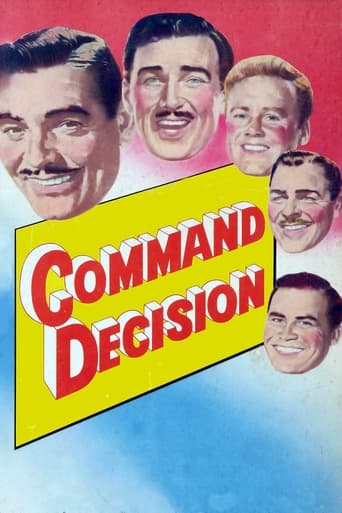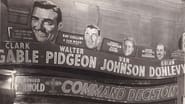PWNYCNY
Even in the middle of war, politics can gum up the works. Military people are told to fight a war, and then are second-guessed by the very same people who told them to fight. That is not fair. This movies dramatizes how politics directly influences command decisions. The movie portrays the top brass as being sycophants who are terrified of disappointing those who fund their projects and career, and what happens if one of the generals refuse to kowtow. This has nothing to do with legitimate civilian oversight of military operations. Rather, it is about how the military is rendered subordinate to politicians who are more interested in making political points at the expense of the military than actually winning the war. Edward Arnold gives a command performance as a US senator who uses his position to try to bully the military to the point that it poses a direct threat to military operations already decided upon at the highest levels. Clark Gable gives one his stronger performances as the general who maintains his integrity and belief in the mission. To commission soldiers to fight a war and then rag them for doing exactly what they have been ordered to do is the height of hypocrisy. Yet, sadly, it is all too true.
greenforest56
My uncle was a 19 year old bombardier in 1943 flying B-17s in the 8th AF. He was shot down over Kastle bombing the factory that made FW 190s. He was shot down on the 2nd bomb run over the target, the first was scrubbed because a smoke screen shrouded the target. The air commander ordered an abort and a 2nd go around. This was considered suicidal because now the AA gunners would have the planes zeroed in. My uncle was shot down on the 2nd run. It was his 24th mission. One more and he would have gone home.So this movie was very striking to me. Not just an old history film. A 'command decision' got my uncle shot down, but it was the right decision. They were there to win the war and that was how you did it.As a film, this movie is excellent, Gable is great and the rest of the cast is very good. The insertion of stock footage was smoothly done and kept the film from being a studio stage play. Altogether a good film worth watching.
sadsit
Regardless of this movie's flaws, there cannot be too much tribute heaped upon the conduct of the men of United States Army 8th Air Force in World War II. This movie does an excellent job of depicting the personal cost of following one's personal convictions in a very harrowing time. Gable does an excellent job a commander under tremendous pressure. In 1943, the 8th was still without long range fighter escort capability, and the danger on deep penetration strikes was horrific. The mission life expectancy of air crew was measured in single digits. It was a shame "Memphis Belle" was turned into a Hollywood-O-Rama version, because the real version of the first bomber crew to survive 25 missions unscathed is sufficient. The losses incurred in trying to knock out the German ball bearing industry over Schweinfurt in October, 1943 very nearly ended daylight bombardment. The fact that even in the face of such opposition, no 8th Air Force mission was ever turned back by enemy action, is an amazing chapter in the annals of war. To me the movie's finest moment comes when Donlevy as General Garnett, who has relieved Gable as the Division Commander, orders the same strike that Gable was going to, against Fendelhorst. Just before he gave that order, Gable gave Donlevy perhaps the finest advice ever found in a war movie. In reference to his men, when he tells him to make sure not one of their lives is wasted.
aimless-46
In a larger sense "Command Decision" is not really a war movie but a film about the responsibility of command and leadership. It is one of the few films that effectively explores these topics; and belongs right up there with the original "Flight of the Phoenix" and "The Red Tent". Not having the visual power of those two films (the limited combat/action scenes are almost entirely stock footage), it must focus more narrowly on the human complications arising from the responsibility of command. The contradiction being that while a leader must cease to be human, no one who can do this is fit to be a leader. Adapted from a stage play, "Command Decision" suffers from a fair amount of "long-windedness". Fortunately the most long-winded character (Major General Kane-played by Walter Pigeon), is well written and has many substantial things to convey. Much like his character in "Forbidden Planet", Pigeon is tasked with inserting historical and philosophical details into the story, and his commanding screen presence makes him ideal for this purpose.Brigadier General K.C. Dennis (Clark Gable) has the most screen time and most challenging role, as his character is the guy stuck between a rock and a hard place. He is accountable for making the hard decisions that send his men off to die, but has a fragile authority dependent on how much independence his superiors are allowing him at a particular point in time. Gable does fine in this part, probably his best totally "serious" performance. Although the film takes pains to use the German high command to illustrate examples of bad leadership, it is easy to infer that the same mindset applies to the Allies. With many military leaders distorting events to cover their own ass and willing to sacrifice men for their own career advancement and personal ideology.The premise of the film is the Air Corps discovery that the Germans have developed the first jet combat plane. Based on the real life Messerschmitt Me-262 (shown as a model in the film and in some archival footage), it is called the "Lantze-Wolf" here and considered so effective as a fighter aircraft that full production would allow the Luftwaffe to regain air supremacy over Europe. The planes are being assembled in three cities deep in Germany. The only hope to delay their full production is "Operation Stitch" (named for its goal of gaining a stitch in time), a plan to attack these sites through dangerous daylight bombing raids. Dangerous because they will be heavily defended and because the bombers will have to go the final hundred miles without fighter escort-since the America fighters do not have the range to reach and return from the target. This type of daylight bombing was called precision bombing because the bomb-site was more effective with better visibility and a lower altitude. The alternative was safer but less accurate saturation bombing at night (insert Dresden here). General Dennis must decide whether to start the operation, and then when the bombers take substantial punishment he must decide whether to continue in the expectation of additional high losses. The film takes certain historical liberties as only after a postwar evaluation of the actual ME-262 did anyone really understand its strategic potential (in the hands of well trained pilots) as a fighter aircraft. Until the end Hitler insisted that it be utilized almost exclusively as a bomber. Although able to carry out this alternative role, its bomb load capacity was too little for any significant impact. That the ME-262 is more a footnote to the war than a major element was due more to Hitler's decision than to any allied efforts to limit its production.Then again, what do I know? I'm only a child.




